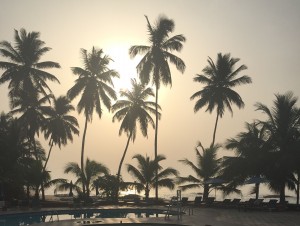 As so often these days, I got the bad news via social media. A friend has sent a FB message, I went on Twitter to see what it was all about and was shocked and saddened by the headlines: 16 dead in Grand Bassam Resort East of Abidjan.
As so often these days, I got the bad news via social media. A friend has sent a FB message, I went on Twitter to see what it was all about and was shocked and saddened by the headlines: 16 dead in Grand Bassam Resort East of Abidjan.
When it was confirmed that Al-Qaeda has accepted responsibility for the act, I tweeted my thoughts and fears.
Sad for the 16 innocent people who lost their lives. Trying to think through what #grandbassam #IvoryCoast attack means to Ghana and to me.
— Kajsa Hallberg Adu (@kajsaha) March 13, 2016
What is the sense? Why are some people so desperate they are willing to kill innocent strangers? How do we live with this constant threat?
— Kajsa Hallberg Adu (@kajsaha) March 13, 2016
Sadly, it is not the first Al-Qaeda attack in the region. Hotels where multiple nationalities and the whole tourism sector can be attacked at once have been the prime target.
Mali in November. Burkina Faso in January. Ivory Coast in March. This is is very close to home.
— Kajsa Hallberg Adu (@kajsaha) March 13, 2016
But this new attack was on the coast, it was in the bustling and growing direct neighbor Ivory Coast, it was so close to home, and that’s why this attack has already affected Ghana. We cannot feel safe here and that will imediately rub off on especially tourism, in the same was the ebola effect did. I am not saying the next attack will come to Ghana, but it is enough that it might. Travellers will prefer to not take the risk and the local economy will suffer for it.
My blog colleague Jemila also discussed the attacks and asked “how many more attacks before regional strategy and action?” and expanded with insight on many of these points and captured them all in this blog post. She wrote:
“Each attack that happens elsewhere shouldn’t just be an occasion to “thank God, it’s not us”. It should also be a “what would we do if”. Simulation and strategizing around different scenarios is key.
We’re in an election year – the lens of the international press will turn to us, we already have a large expat community.
How prepared is Ghana? What will we do – not just for expats – but also for those of us we won’t be evacuated at all cost?”
The question on how ready we are is interesting as we do not speak much about terrorism in Ghana, but we definitely also are not blue-eyed. The major hotels in Accra have for some time now increased their security check you and your car thoroughly before you can enter. Ghana has a system of police presence with barriers in all major communities and as tourism is a major sector, we have everything to win from keeping our guests safe. On the other hand, terrorism is now a global phenomenon and it has showed that it cannot be stopped just by increased security.
Just last weekend, my family went west on a beach trip and lodging on the very same beach strip, just a few hundred kilometres away from Grand Bassam. The same palm trees, the same tropical heat, the same crickets at night. It makes me sad that I now look at that time on the beach as a time of innocence and pure enjoyment that really cannot be recovered.
Despite what has happened, this attack means I will continue enjoying life, keep going to the beach, and walking about town. I will also continue discussing events like these with my students and with my friends across the globe. I will keep inviting them to West Africa! I will continue to work for a world where life is worth living for all.
Because what can we do? If we stop living, to use a cliche, the terrorists have already won.

4 Comments
Another insightful post. Thanks for sharing your views. It’s time for action — not just from our governments alone, but you, me, all bloggers to acknowledge the recognition that those of us working to make West Africa a safer and accommodating place by unpacking important developments in the manifold institutions need to start synergizing with different constituencies, such as the media; bloggers to ensure we work in concert towards the objective of keeping West africa away from those who would seek to destroy it. But, also, a recognition that the large part of our media is too parochial and needs to expand conversations about the regional so as to edify the conversations to a place that is consistent with realities of 21st century international politics.
Thanks for this, EK! Creating successful media on a regional level is difficult to do – look at the EU! Still, you are right, it needs to be done.